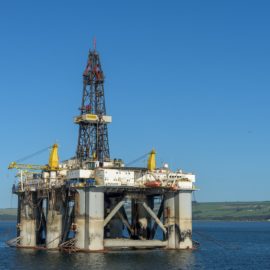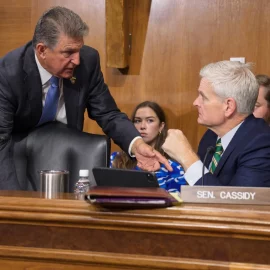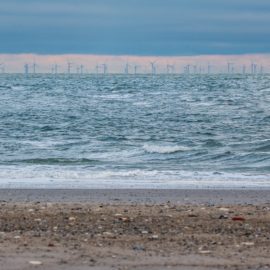
Parishes are visiting congress asking for more money from the offshore energy production.
State and local government officials from across Louisiana are heading to the Washington Mardi Gras this week and their top question for the state’s congressional delegation is “what do we do now?” Parish presidents, police jurors, legislators, bureaucrats, U.S. representatives and U.S. senators, even the governor, set aside partisan animosities and together went all in at Christmas to get the Reinvesting In Shoreline Economies and Ecosystems Act of 2022, called RISEE, on the president’s desk before the 117th Congress expired Dec. 31. They failed. And now they’re regrouping for another stab.
nola,com
RISEE would give the state 20% more money.
RISEE would have done a lot of things, but chiefly the legislation would have lifted the limit on what the federal government pays states in royalties and fees for offshore energy production. That translates into a roughly 20% bump in annual state government income. Most of the money would have gone toward coastal restoration, flood protection and improvements for communities impacted by oil and gas production — much of which are presently covered by Louisiana taxpayers or are just not done for lack of cash. RISEE basically changes the framework detailed in the 2006 Gulf of Mexico Energy Security Act. Under GOMESA, the federal government returns 37.5% of offshore energy revenue to Louisiana, Texas, Mississippi and Alabama, which is subject to a combined cap of about $375 million per year. All monies above the cap go to the federal government. The Land and Water Conservation Fund receives 12.5% of offshore revenue under GOMESA and the final 50% goes to the U.S. Treasury. RISEE would lift that cap and expand federal revenue sharing to 38 coastal states, including those lining the Great Lakes.
Under the new system, we would go from millions to billions.
Louisiana’s 2020 cut under GOMESA was $155.7 million, which was split between state and parish governments. A University of Louisiana at Lafayette analysis estimates that without a cap, Louisiana could pull down about $1.9 billion, depending on the circumstances. RISEE cleared committee with bipartisan support last summer, then stalled waiting for a vote by the full Senate. Louisiana’s congressional delegation, with support from officials back home, pressed to add RISEE to the must-pass, end-of-the-year omnibus bill that authorizes annual spending by federal government agencies. They needed the approval of the top leaders at that time to attach RISEE language to the omnibus. Senate Majority Leader Chuck Schumer, D-N.Y., and Minority Leader Sen. Mitch McConnell, R-Kentucky, and the two top House leaders, House Speaker Nancy Pelosi, D-Calif., and House Minority Leader Kevin McCarthy, R-Calif., refused without giving a reason. People close to the closed-door process speculate that the four’s decision was based on opposition and cost.
This is revenue sharing not a tax.
Revenue sharing isn’t strictly a tax collected then distributed. It’s more money paid by companies for royalties and fees that instead of being deposited in the federal treasury goes to the states where production occurred. About $14 billion would have been diverted under RISEE, according to the Congressional Budget Office. All the bills filed in the 117th Congress died at the end of the year. Now that the newly elected 118th Congress has been sworn in, Louisiana’s six representatives, two senators, and their staffs are beginning the “what if” conversations that lead to cobbling together language that could convince a majority to pass RISEE or a similar bill. “If our nation doesn’t invest in coastal resiliency now, it will spend billions in repairing coastal communities damaged by flooding later,” said U.S. Sen. Bill Cassidy, the Baton Rouge Republican who co-sponsored RISEE with Democratic Sen. Sheldon Whitehouse, of Rhode Island. “My goal this Congress is to make sure that Senators and Members of Congress understand how important this is. Pass it now or pay more later,” Cassidy added.
The House now republican, there are different priorities.
With a narrow Republican majority in the House, new legislation to change GOMESA faces a dramatically different landscape than it did last year. House Republicans, for instance, are seeking spending cuts, which likely would take money from Medicare, Social Security and other social programs. Louisiana’s congresspersons will have to persuade a majority of their colleagues that revenue sharing is a good thing for communities more than 50 miles from a coastline. “Energy production in the Gulf of Mexico is not only essential to America’s national security, but it also provides crucial funding to restore Louisiana’s coast,” said House Majority Leader Steve Scalise, R-Jefferson. “Throughout my time in Congress, I’ve always fought for strong energy revenue sharing to finally provide parity between states like Louisiana and interior states so we have the tools to fund our hurricane protection and coastal restoration projects,” he said. Scalise and U.S. Rep. Troy Carter, D-New Orleans, last year sponsored the Budgeting for Renewable Electrical Energy Zone Earnings. The cap-removing BREEZE measure also must start over from scratch.
The two bills do different things but both increase revenue sharing.
Like RISEE, BREEZE would support building the offshore wind energy industry. But instead of keeping the revenue sharing at 37.5%, BREEZE would increase the states’ share to half the royalties and fees collected. Another 12.5% would go to the U.S. Treasury, and 37.5% to the North American Wetlands Conservation Act fund. NAWCA is the only federal grant program dedicated to the conservation of wetland habitats for migratory birds. But Senate Energy and Natural Resources Committee Chair Joe Manchin, of West Virginia, and other Senate Democrats who had signed onto RISEE, wanted to keep the states’ take at 37.5%. Louisiana U.S. Sen. John N. Kennedy, R-Madisonville and sponsor of the similar Offshore Cap Parity Act bill in 2020, blamed the Democrats. “We fought to get the RISEE Act included, but Republican efforts to get it into the 2023 omnibus were thwarted. Now we’re focused on moving the ball forward in the new Congress,” Kennedy said Thursday. Cassidy’s RISEE co-sponsor, Democratic Sen. Whitehouse, wanted part of the money to flow into the National Oceans and Coastal Security Fund, instead of NAWCA. The Coastal Security would support research, monitoring and restoration activities to respond to rising sea levels and stronger storms caused by global warming.
Each party has a different take on the severity of climate change.
Climate change, Whitehouse says, “poses one of the greatest threats” to the nation’s future. Republicans don’t agree with the level of danger Whitehouse sees and have worked over the past six years to keep a regular source of federal dollars from flowing into the Coastal Security fund. Another implacable foe was the chair of the House Natural Resources Committee, U.S. Rep. Raúl Manuel Grijalva, D-Tucson, Arizona. Generally, the top four congressional leaders want signoff from the committees that oversee the particular bill being considered for addition to the omnibus spending measure. Grijalva would not agree. He argues that revenue sharing incentivizes states to allow more oil and gas production, which would further harm the environment. Over the past 15 years, Grijalva has been a part of several Democratic efforts to lower revenue sharing with energy producing states.
There is a new composition of the House Natural Resources Committee.
On Jan. 10, Republican Rep. Bruce Westerman, of Arkansas, became the new chair of the House Natural Resources Committee, which now has more GOP members than Democratic members, including Republican Rep. Garret Graves, of Baton Rouge. During her 18 years representing Louisiana in the U.S. Senate, Mary Landrieu was integral in getting GOMESA passed, then blocking efforts to lower federal revenue sharing rates. She also worked to lift the cap. As a lobbyist, Landrieu helped the state organize and implement a strategy to get RISEE passed. “We know there’s a smarter way than just sending us disaster money after every storm,” Landrieu said in an interview. “How about investing in preventives? How about investing in coastal resiliency and investing in coastal communities where 60% of the population of the United States lives?”
Good luck with the House and I don’t see much chance of this coming to fruition. I hope I am wrong.



